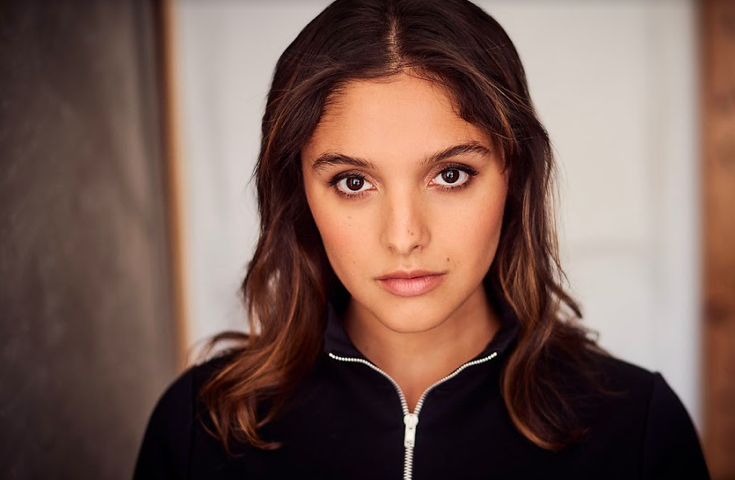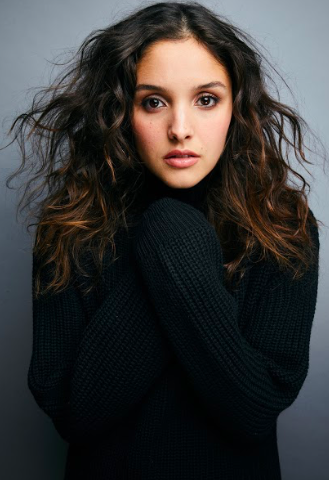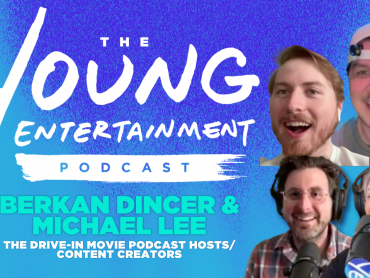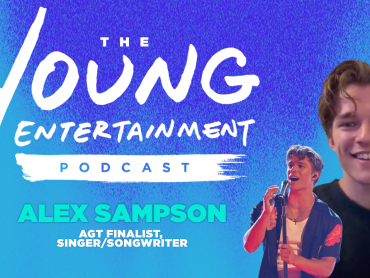Indian-American actress and singer Sheila Houlahan recently held a supporting role in the Warner Bros. feature film The Little Things. She stars opposite Academy Award winners Denzel Washington, Rami Malek and Jared Leto. In the film, Houlahan plays Paige, a girl from the wrong side of the tracks. Her fate is ultimately bound to Kern County Deputy Sheriff Joe “Deke” Deacon, played by Denzel Washington.
Houlahan also was recently cast as a series regular role in the Amazon Prime show “The Scottish Play”, an absurdist comedy about a bunch of degenerates attempting to put on a production of Macbeth. Sheila Houlahan is also an avid activist, and has used her platform to support the “Stop Asian Hate” movement. Find out more about Sheila Houlahan as she takes over our Instagram today!
Young Entertainment Mag: You started out in music, what made you want to start taking an acting career as well?
Sheila Houlahan: Honestly, I ended up pursuing acting on a whim, as a hobby with one of my dear friends. We were living in New York together, so we didn’t want to miss the opportunity to take an acting class at the heart of America’s theatre scene. We stumbled into an on-camera acting class at the recommendation of a friend, and were captivated because it is so completely different from what we were used to doing for opera and musical theatre.
Instead of telling a story for a hall that seats a few thousand, where every moment has to be supersized and projected, we had to learn how to just be, to let the camera come to us, to let intimate moments unfold in a 1 foot by 1 foot space. It fascinated me, and still fascinates me to this day. I love acting because it asks us to be, to simply come as we are, and to find universal truth behind ourselves, our characters, and humanity as a whole.
YEM: Your film “The Little Things” stars Academy Award winners Denzel Washington, Rami Malek and Jared Leto. What was it like to work with them? And did any of them give you tips about the field?
Sheila: I only had the pleasure of working directly with Denzel, and it was a gift. To date, it is one of my favorite on-set experiences ever. He is such a sweet, loving, giving man. A pure soul! I still cannot believe I got paid to functionally attend what felt like a masterclass led by him. Acting requires you to be fully open to every impulse, to truly connect with your scene partners, and he did that to a degree I’ve never seen before. He was so incredibly open and present. The emotions of the scene came out easily because the story was so etched into his soul that it was right there, waiting for me, in his eyes.
I learned so much working with him, like how character and story comes first. You can’t let ego exist in the room, you have to honor the story and the character’s impulses, even if ultimately they’re different from what’s in the script. It was a truly collaborative process. His main tip? “Acting isn’t about the words on the page. Life doesn’t happen in worlds. Life happens in the moments and breaths taken in between the words.”
YEM: What was it like playing Paige Callahan, and who is she?
Sheila: I felt a profound emotional connection to Paige from the get-go, from my first audition. Here is a young woman who drew the short end of the proverbial stick, who didn’t have a say in her destiny, who was snuffed out as her life was just beginning. Her story broke my heart. John Lee’s masterful way of illustrating her soul’s journey really spoke to me.
I find it beautiful that after death, her only wish is to help Deke let go of his guilt, his torment. In my callback, John Lee slowly fed details about this special relationship bit-by-bit, and it took my breath away. It takes a special kind of person to be able to put their own pain down for a moment to take up the mantle for someone else. Deke is that kind of person, and so is Paige.
YEM: You use the platform you were given to advocate for affordable, accessible, and quality mental health care, what makes you so passionate about mental health?
Sheila: I am a survivor of chronic mental health issues and a survivor of our broken mental health care system. I had an eating disorder for 12 years, as well as chronic depression, anxiety and PTSD. It took a decade to fully work through my demons and to have a toolkit that I can use in the moment if any flare-ups occur. I recognize it is my incredible privilege to have access to such skills.
Our mental health care system is a disaster. We currently only have outpatient care, prison-like mental health hospitals (that cause more harm than good) and ridiculously expensive in-patient facilities that usually are not covered by insurance. Some inpatient facilities average $2000 a day for admission! Without providing affordable and accessible care, we continue to let the mental health crisis plague our world. People need care. People need to be heard. Mental health is just as important as physical health.
YEM: How does having a platform such as yours help with advocating for things you are passionate about?
Sheila: I find it is my duty to use my platform for advocacy. I come from a family of passionate, strong female advocates, so I knew advocacy was always going to be in my life; it was so expertly modeled for me by my mother and grandmother. It is a gift to grow up learning why we must not be silent, and I constantly have to check myself and remember that not everyone got to grow up with such a gift.
So many of us are coming into realizing the importance of speaking up later in life. Visibility helps get a message out. People look to folks with a larger platform as role models. We have a responsibility to use our platforms for good. That’s how I feel, at least. Not doing so is just such a colossal missed opportunity. It is the least I can do, to give back, after life has gifted me with so much.
YEM: You are also outspoken on the Anti-Asian racism that is occurring in America, what can people do to help make a difference and a change?
Sheila: First and foremost, talk to the AAPI (Asian American and Pacific Islander) people in your life. Just listen! Don’t try to force your narrative on them. Check in with them, ask them how they’re doing, how you can be of service to them in this moment. Perhaps you can create a buddy system to escort AAPI elders for grocery shopping or other errands.
Let AAPI dictate the terms, let them lead. That is one of the best ways we can show up for our friends, colleagues, neighbors and community. Donate to vetted organizations specializing in assisting AAPI. Educate your non-AAPI family on why these issues matter. It won’t be easy, but small, simple acts like that make a huge difference. Sharing posts on social media is simply not enough.
YEM: Your passion and outspokenness about this issue is because it is near and dear to your heart, how has this issue affected those around you?
Sheila: I identify as AAPI. My mother is from Mumbai, India. I’m half Indian. While we aren’t immediately directly affected, our community as a whole is absolutely affected by recent events. Friends and colleagues who identify as Chinese, Japanese, Korean, Taiwanese, Thai, Pacific Islander, you name it…they’re afraid. They’re scared. They’re hurt that more people aren’t speaking out about this. Goodness knows it makes the allyship surrounding #BLM seem phony if those same allies don’t show up and support the Asian American community.
That’s been the major sentiment I’ve been hearing from both AAPI and BIPOC friends alike: Where is the outrage? Why aren’t people responding to this with the same amount of zeal? Do our lives really matter? Was it all just a sham, a performative piece of theatre? People are hurting right now. People are waiting for folks with more privilege to stand up and declare that this is wrong, that these lives do matter.
YEM: How does being of Asian-American descent affect the way you choose your roles for movies? Do you find that you are constantly trying to find roles that represent Asian-Americans in a less stereotypical way and represent them more multi-dimensionally?
Sheila: Absolutely. If a role feels racist, I don’t want that job. Those aren’t the stories I want to be telling. Frankly, I don’t think those stories need to be told at all, but it isn’t my place to control what narratives come out, it is simply my opinion. I’m drawn to real human beings, in all their imperfection. I’m very intense about not taking on roles that are a different ethnicity from my own. That is a common trend in Hollywood right now, the concept of being “ethnically ambiguous”.
What does that term even mean? I call it being a “vague brown”: you’re clearly not white, but we can’t pigeon-hole what you are within 10 seconds so perhaps we can get away with putting you in brown-face, in yellow-face, in black-face. It just isn’t right. There are so many talented artists out there who can honor their own stories and their own cultures. If race is central to the story, it just isn’t my story to tell.
I’m never going to take away an opportunity from a Latinx artist if their identity is central to the story. Many folks in the industry have urged me to learn spanish, and I simply refuse. Those aren’t my stories to tell. We have to be better if we want Hollywood to change. It will take all of us to make responsible choices surrounding storytelling if we want Hollywood and the world to shift.
YEM: Are you trying to find balance between music and acting? Or do you like to focus on one thing at a time and switch off and on between the two?
Sheila: I take on projects that call to me, regardless of the medium. At the end of the day, singing and acting both use the voice and body as the instrument to express what resides in the heart and soul. The methodology may be different, but at their core it is the same way to tell stories.
While I pour the vast majority of my energy into acting, I take on singing jobs if they light me up. It is such a privilege to get to pick and choose my gigs! If it doesn’t speak to me, I know I’m not going to be able to approach the music or text or whatever medium I’m using with an open heart. That open connection is required to really make a story come to life.
YEM: You were recently cast as a series regular role in the Amazon Prime show “The Scottish Play” can you talk more about the role?
Sheila: This role is way different from most of the dramatic roles I take on! This show was written by a dear friend, and it is goofy as all hell. The Scottish Play is an absurdist comedy about a bunch of degenerates trying to put on a production of Macbeth.
One of the leads of season one ended up stepping down from the show to pursue a different career. So they quickly needed to fill the role with a different character and actor. I’m honored they asked me. We’ve filmed part of season 2, but ultimately had to stop due to a beloved cast member passing from cancer and the COVID-19 quarantine. I know we all can’t wait to resume production.
YEM: What is the major difference between singing and acting in terms of how it fulfills you creatively?
Sheila: For me, there is no difference. Both are ways I use my voice and body to express myself, to tell stories. Both light me up and both make me feel connected with humanity as a whole, with the entire world, with the universe. It is such a sacred, special act to me. It feels like an honor to step into every performance. Before I walk onto set or onto the stage, I always take a quick moment to thank the universe and to ask for my performance to channel the universal human experience.
I strive to make sure my storytelling is relatable to every audience member. So they can each walk away touched and changed by the experience. I want them to feel connected to the process. I know when I’m not connected to that universality, and my work suffers for it. Taking that quick moment to remember why I do this has made all the difference.
YEM: Looking to the future, what do you hope to pursue and work on in the future?
Sheila: As quarantine ends, as we all collectively see the light at the end of the tunnel, we all are preparing ourselves to enter a brand new world. Who knows what the future will bring? I don’t want to lock myself into any iteration of what I think my future should look like, I think that takes the magic out of the experience. Really I want to keep telling stories that excite me, regardless of the format.
I want to dive deeper into writing and producing to ensure that marginalized voices get their stories seen and heard as well. And I want to discover our new universal truth now that we’ve all gone through a major trauma together as a world and are coming out on the other side of it. I want to explore what that has done to us, how we’ve all grown and changed from the experience. I feel really lucky to be where I’m at, and I cannot wait to see what the future will bring.
All I know for sure is that I want to keep using my platform, as it continues to grow, to speak out about what matters. I’m so grateful to everyone who has followed me along on this journey so far, and I hope to continue to do my part in the decades to come. Let’s enter this new tomorrow with open arms, ready for whatever opportunity awaits us!





